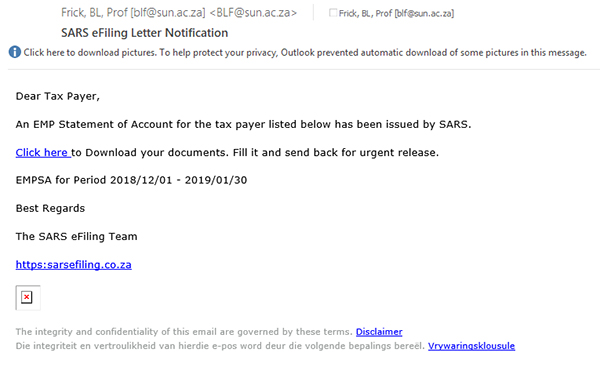For some lucky people, it is time for the tax returns from SARS. The criminals know it too and every year at this time, users will get emails allegedly from SARS promising tax returns and asking you to click on a link, log in and provide your bank account details and password so they can pay you money!
This is a scam, and you should never respond or go to the site or open up the attached file, as this could compromise your banking security.
- SARS has your banking details on record and these are stored in secure and encrypted form. They do not need you to confirm or enter your banking details.
- SARS would always either SMS or send you a registered letter in the post to inform you of tax returns, etc. They would never contact you via unsecured e-mail, and furthermore they have enough of your data to address the mail to you PERSONALLY and not via some vague “Dear Taxpayer” salutation.
- There is no returnfund@sars.co.za address
- The attached file is usually a html (webpage) file that gives you a forged webpage sitting on the criminals server somewhere overseas.
- The amount that they promise to pay you is always something like R9,250.75
- Unless you have added your university e-mail address as the primary contact address on the SARS system you should never get mail on your university account.
If you do go to this site and you do enter in your banking account details, credit card details, passwords etc, this will allow the criminals to log into your bank account via the internet, and take control over your bank account. They will create themselves as beneficiaries and then transfer all your money to their account, and then delete all the evidence pointing to their account.
These scam e-mails will never stop. It is always difficult to block them too because scammers change their addresses, details and methods on a daily basis. So it is always best to dump these mails in the junk mail folder, blacklist the sending domain and delete the mail immediately.
Why do these criminals continue to send their mail? Because they catch people regularly. In 2012 South Africa was the 5th most phished country in the world behind India, Canada, the USA and the UK, with estimated figures of R14 million being stolen from South Africans last year alone.
[ARTICLE BY DAVID WILES]
Vir die gelukkiges onder ons, is dit weer tyd vir SARS se belastingopgawes. Ongelukkig weet die kriminele elemente dit ook en telkens die tyd van die jaar, ontvang gebruikers e-posse wat klaarblyklik deur SARS gestuur word en `n belasting terugbetaling belowe. Al wat jy moet doen is om op `n skakel te kliek, aan te teken, jou bankrekeningdetails en wagwoord te gee en jy kry jou geld!
Natuurlik is dit `n klassieke geval van “phishing”. Moenie eers reageer, na die webwerf gaan of die aangehegte leêr oopmaak nie, aangesien dit jou banksekuriteit sal blootstel. Hier is `n voor-die-hand-liggende redes hoekom jy dit as `n swendelary moet herken:
1. SARS het jou bankdetails op rekord en dit word op `n sekure bediener en in geënkodeerde formaat gestoor. Hulle het nie nodig om jou weer te vra om jou bankdetails te bevestig of te verskaf nie.
2. SARS sal jou altyd SMS of aan jou `n geregistreerde brief deur middel van pos stuur om jou in kennis te stel van enige betalings. Hulle sal jou nie kontak d.m.v. `n onsekure medium soos e-pos nie. Buitendien het hulle ook genoeg inligting om jou persoonlik aan te spreek en nie met `n vae “Dear Taxpayer” nie.
3. Daar bestaan nie `n returnfund@sars.co.za adres nie.
4. Die aangehegde leêr is gewoonlik `n html (webblad) leêr wat lei na `n vervalste webwerf op `n onwettige bediener erens oorsee.
5. Die bedrag is altyd in die omgewing van R9 250.75
6. SARS sal jou nie op jou universiteitsadres kontak tensy jy dit gegee het as jou primêre adres nie.
Indien jy wel na die webwerf gaan, moenie jou bankrekening-details, kredietkaart-details of wagwoord invoer nie – dit sal aan skelms die kans gee om op jou bankrekening aan te teken deur die internet en beheer te neem oor jou bankrekening. Hulle kan dan hulself as begunstigdes byvoeg, al jou geld in hul rekeninge oorplaas en die bewyse wat hulle impliseer uitvee.
Hierdie tipe e-posse sal nooit ophou nie en dis bykans onmoontlik om dit te blok, omdat die kriminele hulle adresse, details en metodes op `n daaglikse basis aanpas. Die beste verweer is om hierdie e-posse in die junk mail leêr te sit, die domain waarvan dit gestuur word op die swartlys te sit en die e-pos dadelik uit te vee.
Hoekom hou hierdie kuberskelms aan om hulle e-posse te stuur? Want mense val telkens daarvoor. In 2012 was Suid-Afrika die 5de hoogste land wat “phising” betref, net na Indië, Kanada, Amerika en Brittanje en `n beraamde R14 miljoen is verlede jaar van Suid-Afrikaners gesteel.
[ARTICLE BY DAVID WILES]



